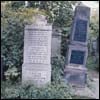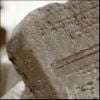The subject of proper conduct at the cemetery is generally neglected. The consequence of this neglect is, frequently, gross impropriety and a super-abundance of superstition. There are two basic principles which can serve as a guide to correct Jewish etiquette on a cemetery. These are:
Kalut Rosh ("Levity")
The holiness of the cemetery is equivalent to the holiness of the sanctuary. Our actions within its confines must be consonant with the high degree of this holiness. Also, because the graves in the cemetery are places from which we may derive no benefit at all, we are restricted from lounging in the area. Kalut rosh is a spirit of levity and undignified behavior. Under the category of the prohibition of kalut rosh, the following points must be observed, and should be followed not only at the gravesite, but within the boundaries of the entire cemetery.
-
Eating and drinking may not take place on the cemetery. This holds true for unveilings as well! The frequent, but unfortunate, frivolity that marks such occasions should certainly be discouraged. It is a violation of every code of honor.
-
Dress should be proper to the occasion and the place. One should not dress to impress relatives who attend. When one visits the cemetery or the grave of a deceased, it is certainly not the time for scant or frivolous-looking dress, athletic attire, or work clothes.
-
One may not step over or sit on the gravestone which directly covers a grave. One may, however, sit on seats near the graves or on roadside railings and gates.
-
Flowers which, perchance, have blossomed on the grave itself may not be picked for use at home. Naturally, trimming the grave is permissible and commendable.
Lo'eg Larash ("Slighting of the Dead")
As noted previously, indulging in pleasurable activities, even religious observances, that the deceased or any of the other occupants of the graves once enjoyed participating in, but now cannot, represents a "slighting of the dead." Thus:
-
One should not study Torah, or recite the Psalms, or conduct formal, daily services within approximately six feet of a grave.
-
One should not carry tefillin or a Torah with him into the cemetery.
Memorial Gifts
Those who wish to honor the dead, or their survivors, may do so in a genuinely religious spirit. They may bring a token of their esteem with them during shiva or send it through the mails.
It is not in keeping with the traditional spirit for this memorial gift to be flowers or fruits. It is more significant and more useful to contribute a sacred article for synagogue or school use. This might include Bibles, prayerbooks, scholarly works, Torahs and Torah ornaments, etc. These will usually be acknowledged by the synagogue or school immediately so that the mourners will be notified of the gift during shiva.
Donations to charities at the time of the funeral is an ancient Jewish custom. The custom has three roots in our tradition:
-
The biblical verse, "Charity saves one from death," is meant to be taken not only literally, but in the spiritual sense, that one who is evil is not considered to be truly alive. Charity saves from "spiritual death." The association of charity and death here is a direct one.
-
Charity symbolizes the unity of all Israel. Contributions of time and effort and substance for the good of the community is an expression of unity. At the funeral it symbolizes the anguish felt in common by all Jews for the family of the deceased.
-
The mystical tradition, embodied in the Chapters of Rabbi Eliezer, says that because of charity will the dead be resurrected in the world to come.
It is in the spirit of dignity, and in keeping with Jewish tradition, to make such contributions as memorials to the dead, rather than to bring outright gifts to the mourners. Naturally, if the deceased felt close to a specific charity, such as a medical research program, it might be wise to contribute to that fund. The memorial gift may be selected by the giver or left to the discretion of the mourners.







Join the Discussion